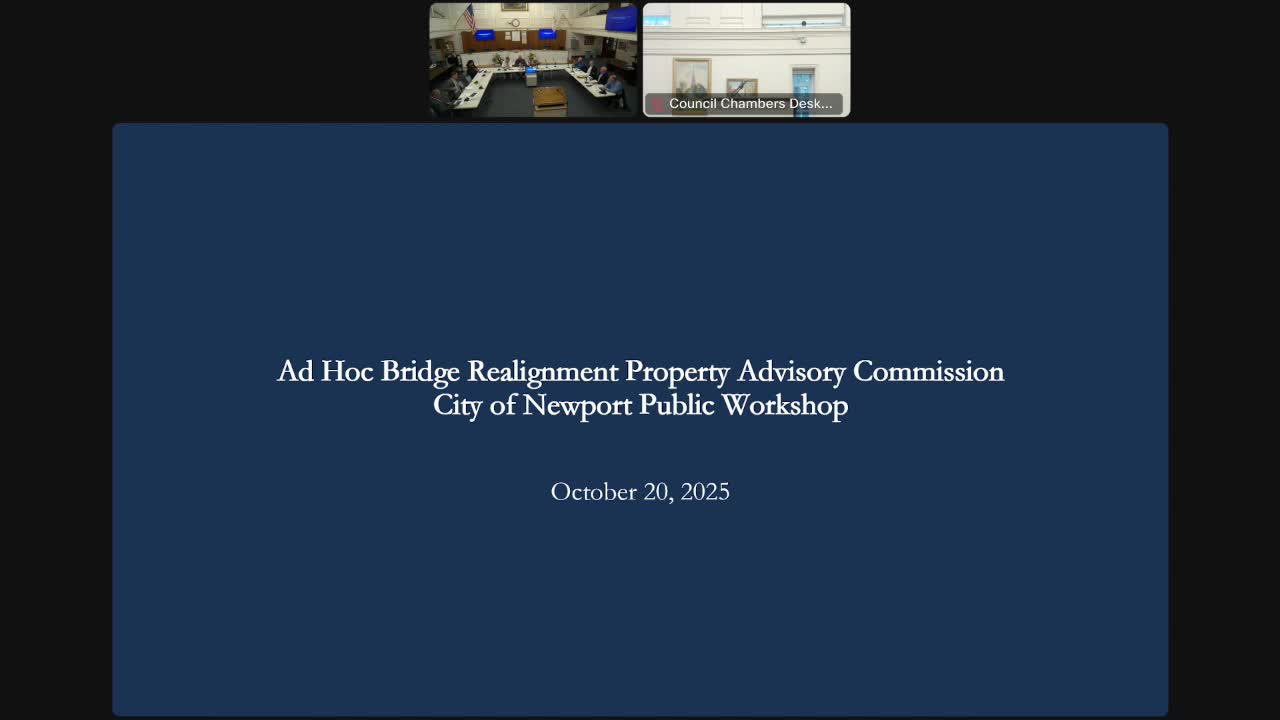Advisory panel urges Newport to seek public control of 25 acres of RIDOT "excess" land and create single redevelopment authority
Get AI-powered insights, summaries, and transcripts
Subscribe
Summary
The ad hoc Bridge Realignment Property Advisory Committee recommended that the City of Newport pursue public control of roughly 25 acres in four Rhode Island Department of Transportation–designated "excess" parcels in the city's North End and establish a single redevelopment authority to coordinate acquisition, permitting and infrastructure work.
The ad hoc Bridge Realignment Property Advisory Committee recommended that the City of Newport pursue public control of roughly 25 acres in four Rhode Island Department of Transportation (RIDOT)–designated “excess” parcels in the city’s North End and form a single redevelopment authority to lead acquisition, permitting and infrastructure work.
The committee reported its findings at a public workshop, saying the parcels have been recorded with the city after approval from the Federal Highway Administration that they are not needed for future highway work. Committee chair Colin Kane said the parcels form a “spine” for the North End but that surrounding properties also must be part of any practical redevelopment strategy because of extensive infrastructure and environmental constraints.
Why it matters: the committee said severe constraints — limited or no electrical, gas, water and telecom distribution; constrained sewer access; extensive freshwater wetlands; poor soil and “dirty” fill; and recurring tidal flooding tied to high tides — make piecemeal development impractical. Kane said those conditions create large permitting and engineering challenges that are best handled by a single execution vehicle with the authority to coordinate projects across multiple parcels and with state regulators.
Kane described the technical obstacles in detail: wetlands that may be characterized as undisturbable by the Rhode Island Department of Environmental Management (DEM); new and emergent wetlands formed by the bridge realignment; geotechnical issues (poor load-bearing fill); and constrained stormwater outflow that drains through the nearby Navy base into the bay. He said those conditions increase the complexity and cost of installing utilities, building roads and siting stormwater basins, and make regional, rather than parcel-by-parcel, permitting attractive.
Regulatory and agency roles: the committee identified DEM, the Coastal Resources Management Council (CRMC), the U.S. Army Corps of Engineers and RIDOT (with Federal Highway oversight) as the principal agencies that will shape what is permissible. Kane said DEM and CRMC staff expressed support for a “master permit” or regional permitting approach in recent meetings but that engineering follow-up and sustained agency engagement will be required.
Appraisal and acquisition path: RIDOT has completed a third-party appraisal and the parcels are recorded with city land evidence, the committee reported. The committee and city staff said RIDOT and Federal Highway set appraisal methodology and that the city presently has a right of first refusal under state law; sources at the meeting said communities normally have 30 days and can typically request extensions. The committee recommended the city seek its own appraisal to test the RIDOT valuation before any sale, and suggested the council consider an executive-session briefing to authorize that step.
Governance recommendation: the panel urged creation or reactivation of a single center of authority — a city chartered or state‑chartered quasi‑public redevelopment entity — that could hold fee title, serve as the disposition and permitting authority, and coordinate infrastructure design and financing. Kane and other advisory members cited precedents including the Quonset Point redevelopment model and the Route 195 redevelopment approach as examples of quasi‑public structures that have used state bonding and coordinated permitting to execute complex, multi‑parcel projects.
Financing and next steps: speakers said infrastructure installation (sewers, power, stormwater) is typically funded through a mix of bonds and usage-fee–backed financing and that state and federal funds have been used in comparable projects. Kane said he would “always like someone else’s money. Right? I’d rather go Dutch,” while emphasizing the city should remain close to RIDOT and state regulators to preserve options. City staff noted an ongoing Jacobs Engineering contract producing technical reports on drainage and flood analysis; staff said conceptual engineering and coordination between city departments is already underway and a technical report is expected in January 2026.
Timing and urgency: committee members told the council there is some urgency to remain engaged with RIDOT because other third parties could pursue parcels once they are offered. At the same time, the committee and staff cautioned that environmental remediation, wetlands delineation and engineering due diligence must be completed before committing to large-scale investments. The panel recommended the council authorize follow-up steps that could include: directing staff to negotiate with RIDOT, authorizing a city-commissioned appraisal, convening a small “tiger team” of planning/engineering/attorney staff for due diligence, and pursuing sustained engagement with DEM and CRMC.
Public and council reaction: councilors and the mayor asked questions about governance, oversight, and how to ensure any quasi‑public body would adhere to local zoning and planning standards. Some councilors pressed whether state involvement would dilute local control; advisors said governance design is a tradeoff that can yield state resources and bonding but must be structured to preserve city planning guardrails. Several councilors and staff expressed support for moving toward acquisition and additional due diligence.
What the committee did not decide: the committee did not recommend a specific future land use for the North End parcels (open space, daylighting Elizabeth Brook, housing or commercial) and explicitly stated those choices should be driven by the city’s objectives, neighborhood input and permitting realities. No formal council vote or transfer of title occurred at the workshop.
Next procedural steps reported at the workshop: RIDOT’s third‑party appraisal is complete and recorded; the committee and staff proposed the city obtain its own appraisal and prepare for an executive‑session review; staff said the parcels are recorded with the city’s land evidence office and technical studies are advancing under existing Jacobs Engineering work. Kane and staff encouraged regular, coordinated meetings with DEM and other state regulators while pursuing acquisition options.
